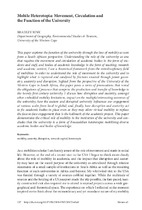Mobile heterotopia: movement, circulation and the function of the university
Abstract
This paper explores the function of the university through the lens of mobility as seen from a South African perspective. Understanding the role of the university as one that requires the movement and circulation of academic bodies in the form of students and staff, and bodies of academic knowledge in the form of teaching, research and academic content, I use a theoretical framework from the interdisciplinary field of mobilities in order to understand the role of movement in the university and to highlight what is ruptured and catalysed by frictions enacted through power geometry, austerity and disruption. Sighted from the perspective of the University of the Western Cape in South Africa, this paper poses a series of provocations that reveal the obligations of presence that comprise the production and transfer of knowledge in the twenty-first-century university. I discuss how disruption and austerity, amongst other embedded mobility limitations, impact on the multiple/intersecting universes of the university; how the austere and disrupted university influences our engagement at various scales from local to global; and, finally, how disruption and austerity act to fix academic bodies in place even as they may allow virtual mobility to replace the face-to-face engagement that is the hallmark of the academic project. This paper demonstrates the critical role of mobility in the institution of the university and concludes that the university is a form of Foucauldian heterotopia mobilising diverse academic bodies and bodies of knowledge.

